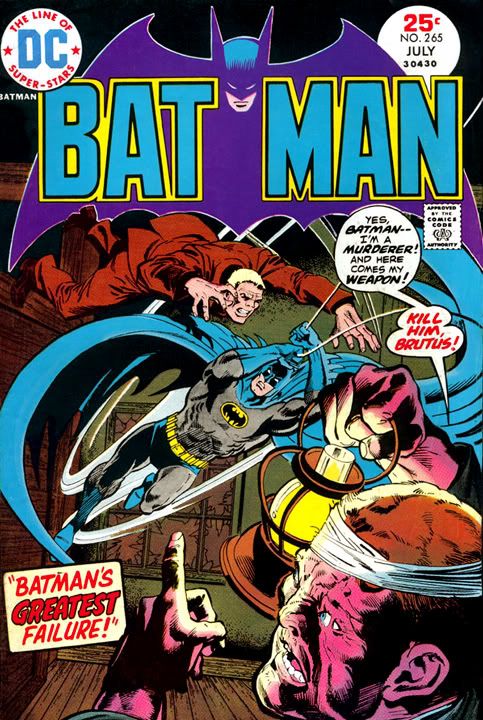 Why is Batman swinging on a rope inside a shack? Just how high is that ceiling? The cover promises mysteries galore as we leave the war comics—and fabled year 1974—behind to look at a Batman comic from 1975, Batman #265 to be precise.
Why is Batman swinging on a rope inside a shack? Just how high is that ceiling? The cover promises mysteries galore as we leave the war comics—and fabled year 1974—behind to look at a Batman comic from 1975, Batman #265 to be precise.The script is by Mike Fleisher (although the letters page references a recent story by legendary Bat-writer Denny O’Neill) and the art is by Rich Buckler… inked by Bernie Wrightson! Whatta combination! Fleisher later sued Harlan Ellison and Gary Groth for libel, and Buckler went on to draw Reagan's Raiders.
I don't know what happened to Wrightson. Seems to have lapsed into obscurity. Perhaps this was his only comic book work. Shame, as he shows great promise...
This, then, is the revelation of Batman’s greatest failure, a tale Fleisher calls, strangely enough, “Batman’s Greatest Failure!" And fail Batman does, but like most hyperbolic statements, the title’s not very accurate. I mean, this case occurs relatively early in Batman’s career, so it seems almost like hubris to proclaim it as his greatest failure; who knows how spectacularly he might fail in years to come? Why tempt fate?
It’s fast-paced and ripping with said failure as its clever hook, a comic from back in the days when a writer used a single issue and pared things down to fit. An arrogant movie star named Robert "Bob" Trenton botches an exploding car stunt on the set of his latest film, and neither Batman nor Trenton’s hulking bodyguard Brutus can rescue him from the flames before he’s horribly disfigured. Embittered and more than a little crazy, Trenton escapes the hospital with revenge in mind. After electrocuting the movie's director, Trenton gets a taste for the killing and starts sending Batman taunting notes.
What was it with 1970s-era DC and burn victims or facial scarring? There’s the commander from “Glutton for Punishment” in Weird War Tales #32 who gets cooked, Jonah Hex (also written by Fleisher) and his scarred visage, and recurring appearances by Two-Face. Then there's the antagonist of this story, whose reveal horrified yet fascinated me when I was a mere seven years old. Perhaps facial scarring should be listed as a story motif along with the old “injury to the eye” and the number three.
Speaking of threes—notice how Fleisher’s plot also uses that device. Three people appear to die. Two would’ve been too few, four too many. Three, again, is the magic number. Three deaths are exactly how many you need in this case. The first one bothers Gordon, but he can write it off as a fluke, the second one angers him and the third one makes him go completely apeshit. The story structure here is as solid and as well-constructed as the playhouse my dad built for me around the time I first read this comic-- that little house is still standing, and will probably outlast my childhood home.
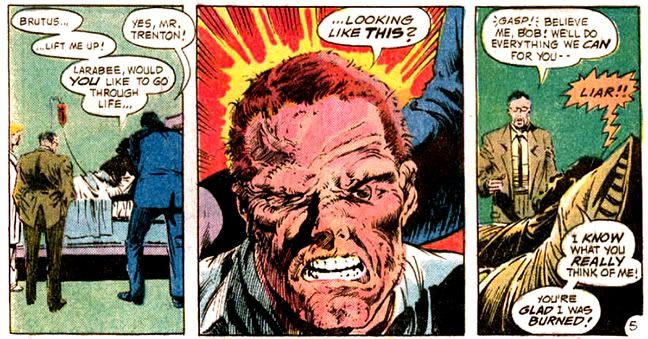 Obviously, Batman comes through in the end, tracking Brutus to Trenton’s hideout and setting fire to the place during a vicious fight. Trenton perishes in the flames, and Batman tells Gordon to book Brutus for attempted murder. "Attempted murder?! What--?" a simply astonished Gordon shrieks, as if Batman has finally lost his mind completely.
Obviously, Batman comes through in the end, tracking Brutus to Trenton’s hideout and setting fire to the place during a vicious fight. Trenton perishes in the flames, and Batman tells Gordon to book Brutus for attempted murder. "Attempted murder?! What--?" a simply astonished Gordon shrieks, as if Batman has finally lost his mind completely.
"Brutus didn't kill anybody, Commissioner! All three of his intended victims are alive and in hiding!" Batman cooly replies, then explains how he anticipated Trenton's plans and faked the murders in order to buy enough time to find Trenton before someone really got hurt. Gordon slaps Batman on the back, all is well… or is it? Batman’s gaze lingers on Trenton’s empty wheelchair, as the flames rise all around it.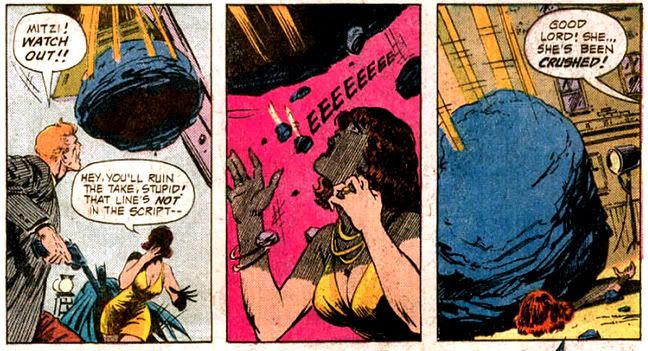 But as well-organized as the story is, there are some problematic areas that didn’t occur to my seven-year-old self when I first read it and worried about Batman's inability follow through on his vow to protect those seemingly luckless movie people. Or any of the subsequent times I read it, for that matter. And I read it a lot because it was the only Batman comic I had for a quite some time.
But as well-organized as the story is, there are some problematic areas that didn’t occur to my seven-year-old self when I first read it and worried about Batman's inability follow through on his vow to protect those seemingly luckless movie people. Or any of the subsequent times I read it, for that matter. And I read it a lot because it was the only Batman comic I had for a quite some time.
Here's my biggest qualm: Why couldn’t Batman inform Commissioner Gordon of his plan in the first place and spare the both of them a lot of grief? Batman had plenty of time to set up the whole ruse with the actors and the special effects crew, so it makes no sense he couldn't also tell the police commissioner, his closest ally and friend.
This leaves a Gordon who's more a plot construct rather than a fully-realized character. He’s worked with Batman for a few years and knows his operating methods are… shall we say… unorthodox. But rather than give Batman the benefit of the doubt, he berates him whenever an actor seemingly dies. Of course, he has to do that for the reader’s benefit—this is “Batman’s Greatest Failure!” and things are supposed to seem pretty bleak for the Darknight Detective, right? But it’s such an obvious plot-based artifice, Gordon never seems believable. And his threat, “One more botch and I'm taking you off this case!”
Here's another: When did Gordon appoint himself Batman's boss, with the ability both to assign and fire him from a case? Realistically, what could he do if Batman decides to pursue a crime independently—write him a nasty letter? Uninvite him to his birthday party that year? Even Batman doesn't take Gordon's blustering very seriously in this story.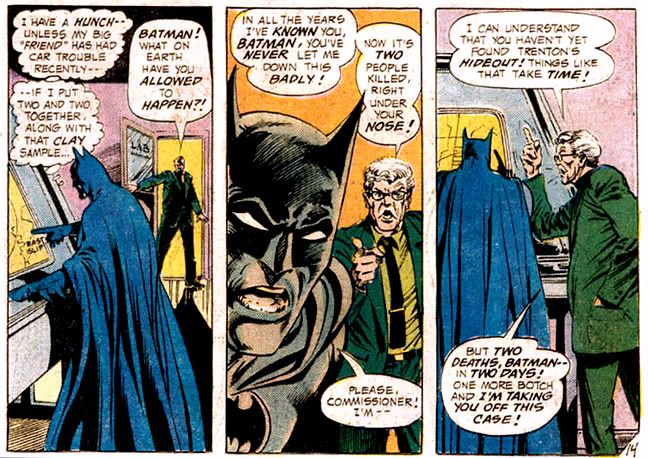 And another: As muffed as his Gordon characterization is, Fleisher’s Batman is right on. He has Batman act like a detective. He works to solve the case, uses his brain in a realistic way to formulate a trap, then gathers clues and finds Trenton’s hideout.
And another: As muffed as his Gordon characterization is, Fleisher’s Batman is right on. He has Batman act like a detective. He works to solve the case, uses his brain in a realistic way to formulate a trap, then gathers clues and finds Trenton’s hideout.
Unfortunately, the clues don't really play a huge part in the climax. Batman could have just as easily chased Brutus to Trenton's lair-- which is really just a junkyard shack on the edge of town. I doubt Fleisher could've stuck the guy in a place more obvious or less creative. But Fleisher's story at least pays some tribute to Batman's detective aspect, rather than treat us to a lot of scenes where Batman grits his teeth and alienates everyone around him, then puts it all together in a flash of inhuman insight, because not only had he prepared for Trenton’s turn to madness several years before before his accident, but he'd also set up several alternate plans which were triggered automatically the moment Trenton’s car blew up. Plans which somehow pit Nightwing against Batgirl, with Robin caught in the middle, none of them privy to any of their mentor's asinine methodology.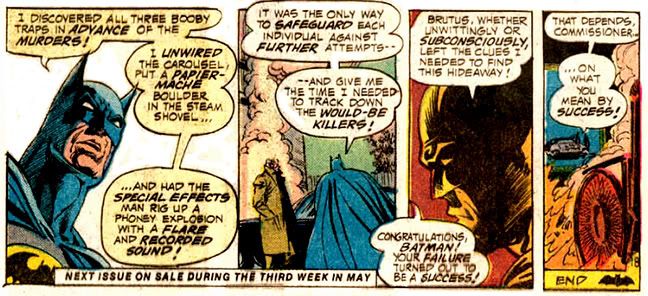 And finally: When you get right down to it, I'm not sure Batman is really necessary to this case in the first place. The villain is merely a pissed-off Hollywood (former) pretty boy, he's none too subtle about his threats and it would've been a lot more logical to put regular police on the set to protect everyone while Batman goes off and fights hardcore freaks like the Joker instead. But then would could've known Trenton would give the vaunted Batman so much trouble?
And finally: When you get right down to it, I'm not sure Batman is really necessary to this case in the first place. The villain is merely a pissed-off Hollywood (former) pretty boy, he's none too subtle about his threats and it would've been a lot more logical to put regular police on the set to protect everyone while Batman goes off and fights hardcore freaks like the Joker instead. But then would could've known Trenton would give the vaunted Batman so much trouble?
You know what? All nitpicking aside, I like this fallible Batman more than the inflexible asshole he’s become over the years. He's without that Frank Miller-style borderline psychosis so many writers like to play with nowadays. Sure, he’s still kind of a dick—he mocks Gordon's window padlock, then hints at having tapped the commissioner's official phone-line—but he does it with a smile. Batman… smiling? Written by Fleisher, he's human enough not only to smirk a little but also to get conked on the head by beefy lug Brutus, and actually has trouble with him in the final fight, thinking, “No matter how much you've trained-- an opponent's size and weight... can make a -- UNNGGH-- difference!"
If this fight scene were written today, there’d be several first-person narrative captions salted among the panels where Batman tells us, “He’s big. Stupid. Slow. I snap his wrist back. It breaks. He loses interest in the fight.” Do DC editors force writers to script that stuff, or do they come up with it on their own after reading Dark Knight Returns a million times in one week until it overloads their ability to think for themselves? 1975-era Batman is edgy but has charm and class; modern-era Batman is a thoroughly unlikeable prick (unless you're really into joyless fascists) and therefore a lot less interesting as a character.

No comments:
Post a Comment